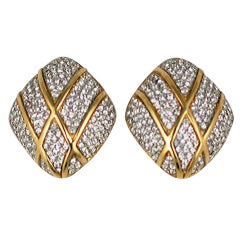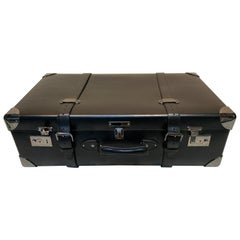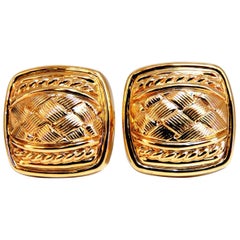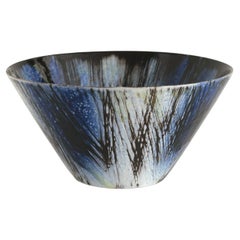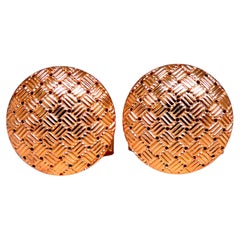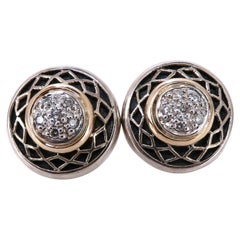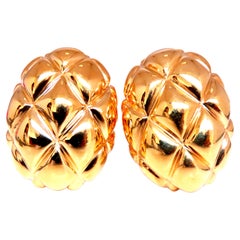Cross Hatch
to
94
994
193
688
359
232
214
164
142
98
90
88
83
75
66
55
53
38
32
26
26
20
18
17
15
14
13
12
11
10
8
8
7
6
5
5
5
5
4
4
3
2
2
1
1
1
1
1
1
1
1
115
12
8
6
6
Sort By
Ciner Pave Cross Hatch Earclips
By Ciner
Located in New York, NY
Attractive pave earclips by Ciner, NY with gold cross hatched motifs on a pave background. 1 1/4" x
Category
Vintage 1980s American Clip-on Earrings
Asprey Londoner Trolley, Black Cross Hatch Suitcase
By Asprey International Limited
Located in West Palm Beach, FL
Asprey Londoner tolley, 30" black cross hatch suitcase, handstitched black saddle hide leather
Category
21st Century and Contemporary English Modern Trunks and Luggage
Materials
Chrome
3x3 Cross Hatch Bears
Located in Boston, MA
Artist: fnnch,
Title: 3x3 Cross Hatch Bears
Date: 2024
Medium: Aerosol on canvas
Unframed
Category
2010s Contemporary Paintings
Materials
Canvas, Spray Paint
Color Bears Cross Hatch
Located in Boston, MA
Artist: fnnch,
Title: Color Bears Cross Hatch
Date: 2024
Medium: Aerosol on canvas
Unframed
Category
2010s Contemporary Paintings
Materials
Canvas, Spray Paint
14 Karat Cross Hatch and Rope Twist Deco Clip Earrings
Located in New York, NY
Cross Hatch Pattern / Rope Twist Clip Earrings
Measurements of Earrings:
.86 x .87Inch
Category
2010s American Clip-on Earrings
Materials
14k Gold, Yellow Gold
Mari Simmulsson "cross-hatched" Bowl for Upsala Ekeby, Scandinavian Modern
By Upsala Ekeby, Mari Simmulson
Located in New York, NY
A Mari Simmulsson “cross-hatched” glazed bowl in blue, black and touches of yellow, for Upsala
Category
Mid-20th Century Scandinavian Scandinavian Modern Decorative Bowls
Materials
Ceramic
Cross Hatch Deco Round Raised Dome Button Cufflinks 14kt gold 12366
By Unbranded
Located in New York, NY
Gorgeous Cross Hatch 3D texture cufflinks
14kt yellow gold
15.8 grams
20mm wide
Depth: 5.8mm
17
Category
21st Century and Contemporary Medieval Cufflinks
Materials
14k Gold
Designer Bordeaux .10ct Natural Diamond Earrings Cross Hatch Deco Silver & 14kt
Located in New York, NY
Circular cross hatch deco stud
.10 carat natural round diamonds
H color vs2 clarity
Silver
Category
2010s American Stud Earrings
Materials
Diamond, 14k Gold, Silver
$800
W 0.52 in D 0.26 in
Basket Weave Cross Hatch Omega Clip Earrings Elongated Weave 18kt gold 12582
By Unbranded
Located in New York, NY
high shine cross hatch basket weave
omega clip earrings
dome puff raised
18kt yellow gold 24.6
Category
21st Century and Contemporary Contemporary Drop Earrings
Materials
18k Gold
Vintage Turkish Cross-Hatch Design Oushak Rug by Keivan Woven Arts 4'2 x 9'7
Located in Atlanta, GA
Vintage Turkish Cross-Hatch Trellis Design Oushak Rug by Keivan Woven Arts
Measures: 4'2 x 9'7
Category
Mid-20th Century Turkish Oushak Turkish Rugs
Materials
Wool
Mid-Century Pearl & Gold Necklace with Cross hatch Design Clasp
Located in New York, NY
twisted rope design in a cross hatch form and is set with 11 smaller pearls. One could wear this with the
Category
Vintage 1960s American Modernist Beaded Necklaces
Materials
Pearl, Gold
Leach Pottery St Ives Studio Pottery Cross Hatch Pattern Brush Pot
By Leach Pottery
Located in Bishop's Stortford, Hertfordshire
A stylish and delightful stoneware studio pottery brush pot decorated with a cross hatch design
Category
Vintage 1940s English Mid-Century Modern Ceramics
Materials
Stoneware
Jan Erika "Cross Hatch 1"
Located in Hudson, NY
black and white. Titled, "Cross Hairs 1", the Giclee fine art print is available in a limited edition
Category
2010s British Modern Prints
Materials
Wood, Paper
Jan Erika "Cross Hatch 2"
Located in Hudson, NY
black and white. Titled, "Cross Hairs 2", the Giclee fine art print is available in a limited edition
Category
2010s British Modern Prints
Materials
Wood, Paper
"Black Drawing (Introductions)" Charcoal Cross-Hatch Drawing on Canvas 1976
Located in Arp, TX
to the artist's meticulous craftsmanship and creative vision. The intricate charcoal cross-hatch
Category
1970s Abstract Abstract Drawings and Watercolors
Materials
Canvas, Charcoal
Price Upon Request
H 59.5 in W 92.25 in
ELLERY navy polyester wool white cross hatch stitching flared skirt US2 XS
By Ellery
Located in Hong Kong, NT
ELLERY navy polyester wool white cross hatch stitching flared skirt US2 XS
Reference: KNLM/A00183
Category
21st Century and Contemporary Australian A-Line Skirts
JEAN PAUL GAULTIER, long cross hatch black and white print, faux fur cuffs coat
By Jean Paul Gaultier
Located in Kingston, NY
JEAN PAUL GAULTIER, long cross hatch black and white print, faux fur cuffs and removable faux
Category
Late 20th Century Italian Coats and Outerwear
$600 Sale Price
20% Off
1980s "#20" Charcoal Cross Hatch Abstract Drawing Modern Art Jack Scott
Located in Arp, TX
available for purchase, this is one of fifteen 40"x30" cross-hatch, charcoal drawings on Strathmore paper
Category
1980s Abstract Abstract Drawings and Watercolors
Materials
Paper, Charcoal
$4,000
H 30 in W 40 in D 2 in
David Webb Platinum & 18K Yellow Gold Rock Crystal Cross Hatched Bracelet
By David Webb
Located in New York, NY
two modified cushion-shaped, cross-hatch carved rock crystals, each approximately 32.0 x 32.0 mm
Category
20th Century American Modern Bangles
Materials
Crystal, Rock Crystal, 18k Gold, Yellow Gold
"Slow Blur" Charcoal Cross-Hatch Drawing on Canvas 1976 Jack Scott
Located in Arp, TX
meticulous craftsmanship and creative vision. The intricate charcoal cross-hatch arches create a captivating
Category
1970s Abstract Abstract Drawings and Watercolors
Materials
Canvas, Charcoal
Price Upon Request
H 60.25 in W 89.25 in
Graver Cross Hatch Cufflinks 14kt 12475
By Unbranded
Located in New York, NY
zen deco cufflinks
19 x 14mm
16.2 grams
14kt white gold
Category
21st Century and Contemporary Contemporary Cufflinks
Materials
14k Gold
"T-Blur" Large Charcoal Cross-Hatch Drawing on Canvas 1977 Jack Scott
Located in Arp, TX
charcoal cross-hatch arches create a play of light and shadow, each mark bearing the artist's hand. To
Category
1970s Abstract Abstract Drawings and Watercolors
Materials
Canvas, Charcoal
Price Upon Request
H 59.5 in W 69 in
Untitled (Cross Hatch) /// Abstract Geometric Jasper Johns Minimal Screenprint
By Jasper Johns
Located in Saint Augustine, FL
Artist: Jasper Johns (American, 1930-)
Title: "Untitled (Cross Hatch)"
Series: Jasper Johns
Category
1970s Abstract Abstract Prints
Materials
Screen, Parchment Paper
$4,000
H 16.5 in W 16.5 in
"Clear Lobe" Free Hand Charcoal Cross-Hatch Drawing on Canvas 1977 Jack Scott
Located in Arp, TX
meticulous craftsmanship and creative vision. The intricate charcoal cross-hatch arches create a captivating
Category
1970s Abstract Abstract Drawings and Watercolors
Materials
Canvas, Charcoal
Price Upon Request
H 57 in W 83.25 in
"Black Arc, High Arc" Charcoal Cross-Hatch Drawing on Canvas 1976 Jack Scott
Located in Arp, TX
artist's meticulous craftsmanship and creative vision. The intricate charcoal cross-hatch arches create a
Category
1970s Abstract Abstract Drawings and Watercolors
Materials
Canvas, Charcoal
Price Upon Request
H 60 in W 90.25 in
"Airveil" Charcoal Cross-Hatch Drawing on Canvas 1976 Jack Scott
Located in Arp, TX
vision. The intricate charcoal cross-hatch arches create a captivating play of light and shadow, each
Category
1970s Abstract Abstract Drawings and Watercolors
Materials
Canvas, Charcoal
Price Upon Request
H 57 in W 83.25 in
Big Little #144 (Contemporary Plaid Cross-Hatched Pattern Geometric Abstraction)
By Vincent Pomilio
Located in Hudson, NY
a delightful cross hatched pattern in a juicy red color applied using pigmented plaster and acrylic
Category
2010s Abstract Geometric Abstract Paintings
Materials
Marble
$1,200
H 12 in W 12 in D 1.5 in
"Light Black Blur #2" Charcoal Cross-Hatch Drawing Canvas 1978 Monumental Piece
Located in Arp, TX
charcoal cross-hatch arches create a captivating play of light and shadow, each mark bearing the artist's
Category
1970s American Modern Abstract Drawings and Watercolors
Materials
Canvas, Charcoal
Price Upon Request
H 83.25 in W 177.25 in D 0.5 in
14 Karat Gold Cross Hatch Textured Clip Earrings
Located in New York, NY
Wide Hoop Earrings
Measurements of Earrings:
.85 x .60 Inch
Depth: .36 inch
Comfortable Omega Clips
7.5 grams / 14kt. white Gold
Earrings are gorgeous made
Category
2010s American Clip-on Earrings
Materials
14k Gold, White Gold
Cross Hatch, Pen & Ink on Paper by Artist Jogen Chowdhury "In Stock
By Jogen Chowdhury
Located in Kolkata, West Bengal
Jogen Chowdhury
Cross Hatch, Pen & Ink on Paper
11 x 10 Inches 28 x 25.4 cm
2016 (Price on
Category
2010s Modern Figurative Paintings
Materials
Paper, Mixed Media, Ink, Pen
$36,000
H 11 in W 10 in D 1 in
The MCA : Machine Cross Hatched Titanium Comfort Fit Wedding Band
Located in Fergus Falls, MN
Pure titanium. Machine crosshatched. Polished interior.
The machine-cut crosshatched pattern has a decidedly industrial feel. However, as the light catches the peaks and valleys of ...
Category
21st Century and Contemporary American Contemporary Wedding Rings
Materials
Titanium
Cross Hatch- Screenprint in colors on Patapar printing parchment from 1977
By Jasper Johns
Located in Philadelphia, PA
Jasper Johns b.1930
Untitled
1977
screenprint in colors on Patapar printing parchment
image: 9¼ h × 9 w in (23 × 23 cm)
sheet: 9¾ h × 10 w in (25 × 25 cm)
This work is from the edit...
Category
1970s Prints and Multiples
Materials
Lithograph, Screen
2.87CT Hinged Flex Grill Weave Cross Hatch Deco Diamonds Ring 18KT Blacken
Located in New York, NY
Hinged Flexible Ribbed Grill Crosshatch 3D Deco Ring
Diamonds mounted bead set pave
2.87ct.
Rounds & Full cuts
F/G-color
Vs-2 clarity.
18Kt Blackened Gold
20.5 Grams
Overa...
Category
2010s American Band Rings
Materials
Diamond, 18k Gold
Vintage Tribal Figural Sculpture
Located in Queens, NY
Vintage carved figure of a male dancer with cross hatched ear design
Category
20th Century Unknown Tribal Figurative Sculptures
Materials
Wood
Vintage 1960s David Webb Crystal Earrings
By David Webb
Located in New York, NY
Finely crafted in 18k yellow gold with cross-hatched Rock Crystals.
Signed by David Webb
Circa
Category
Vintage 1960s Clip-on Earrings
Materials
Rock Crystal, 18k Gold
Vintage 1960s David Webb Three Crystal Necklace
By David Webb
Located in New York, NY
Finely crafted in 18k yellow gold with three cross-hatched Rock Crystals.
Signed by David Webb
Category
Vintage 1960s Choker Necklaces
Materials
Rock Crystal, 18k Gold
Black Scored Obelisk with Black Base and Round Feet
Located in Los Angeles, CA
Very nice obelisk with cross hatch scored pattern on black bone-like material with black base and
Category
20th Century Obelisks
Materials
Metal
Slate Low Coffee Table
Located in New York, NY
Large slab of slate sitting on top of a wooden, cross-hatched base. In good original condition with
Category
21st Century and Contemporary American Mid-Century Modern Coffee and Coc...
Materials
Stone
English Country House Brass Railed Iron Firescreen
Located in Greenwich, CT
An English 19th c. country house iron firescreen featuring heavy cross-hatched wire mesh, brass top
Category
Antique 1860s English Fireplaces and Mantels
Materials
Iron
Antique Black Amethyst Glass and Gilt Metal Jewelry or Trinket Box / Casket
Located in New York, NY
Pretty antique (19th century) jewelry or trinket chest made from black amethyst glass with cross
Category
Antique Late 19th Century Jewelry Boxes
Materials
Metal
$1,250
H 3.63 in W 5.13 in D 3.25 in
Large French Louis Philippe Arched Wall Mirror
Located in Hudson, NY
A large French Louis Philippe wall mirror. The frame has an arched top with a cross hatched
Category
Early 20th Century French Louis Philippe Wall Mirrors
Materials
Silver Leaf
Pair of Glass Urn-Shaped Lamps
Located in West Palm Beach, FL
Pair of urn shaped glass lamps, in Baccarat style, of fluted and cross hatch glass, on square black
Category
Vintage 1950s American Table Lamps
Materials
Marble, Brass
Victorian Sixty Piece Blue Cut To Clear Crystal Stemware
Located in Essex, MA
liqueurs, 14 assorted wines. Blue cut to clear with cross hatch cut.
Category
Antique Late 19th Century English Victorian Crystal Serveware
Materials
Cut Glass
Set of American Ball Top Polished Steel and Brass Tools on Stand, Circa 1840
Located in Charleston, SC
Set of American ball top polished steel and brass fire tools resting on a matching cross hatched
Category
Antique 1840s American American Empire Fireplace Tools and Chimney Pots
Materials
Brass, Steel, Iron
$4,800
H 31 in W 8.25 in D 7.5 in
French 18K Yellow Gold Cross Pendant
Located in London, GB
with a cross-hatched textured surface. The second layer is raised and hollow to the vertical, with a
Category
20th Century French Pendant Necklaces
Materials
Gold, 18k Gold, Yellow Gold
9ct 375 Gold 1960s Locket
Located in London, GB
9ct 375 Gold Vintage
pocket watch shaped Locket
with central starburst and brutalist cross hatch
Category
Mid-20th Century British Pendant Necklaces
Materials
Gold, 9k Gold
Pair of Venetian Murano Glass Pineapple Style Table Lamps with Gilt Scrolls
Located in Atlanta, GA
cross-hatched motifs, gilt metal scrolls and stepped bases. Created in Murano during the 20th century
Category
20th Century Italian Table Lamps
Materials
Metal
$7,500 / set
H 29.75 in W 8 in D 8 in
French Limoges Rectangular Hand Painted Porcelain Trinket Box
By Limoges
Located in Haddonfield, NJ
fantastic cross hatch design on the lid. This piece would certainly be a fantastic addition to an existing
Category
Mid-20th Century French French Provincial Decorative Boxes
Materials
Gold, Brass
Two French Mid-Century Modern Wire Waste Baskets, Jacques Adnet
By Jacques Adnet
Located in New York, NY
aesthetics. The pieces are composed of black enameled wire woven in a classic cross-hatched pattern completed
Category
Mid-20th Century French Mid-Century Modern Magazine Racks and Stands
Pair of Midcentury Iron and Bronze Headboards
Located in Rio Vista, CA
cross hatch pattern design and bronze ball finials on the tops. There is no mounting hardware attached
Category
20th Century French Mid-Century Modern Beds and Bed Frames
Materials
Bronze, Iron
12 Exquisite Moser Floral Enameled Cut to Clear Enamel Water/Wine Goblets
By Moser Glassworks
Located in West Palm Beach, FL
cross-hatched colorless crystal stems, with an oval enameled floral bouquet.
Unmarked.
Measures: 7
Category
20th Century Czech Crystal Serveware
Materials
Crystal
$3,160 Sale Price / set
20% Off
H 7 in Dm 3.25 in
Metal Paper Bin, circa 1950
Located in Barcelona, ES
Metal paper bin made by wire woven in a classic cross-hatched pattern completed by a solid ring
Category
Vintage 1950s French Mid-Century Modern Decorative Baskets
Materials
Metal
Bench Built Parquetry Coffee Table in the Manner of Paul Laszlo
Located in Chicago, IL
. Studio piece with subtle refinement. Beautiful figured and bleached walnut top with mahogany cross hatch
Category
Vintage 1950s American Coffee and Cocktail Tables
Materials
Walnut, Plywood
Luigi Caccia Dominioni for Azucena "Tommy LSP6 XL" Wall Lamp, Italy 1960s
By Luigi Caccia Dominioni, Azucena
Located in Naples, IT
rim and a cross-hatched textured acrylic diffuser.
Category
Vintage 1960s Italian Mid-Century Modern Wall Lights and Sconces
Materials
Brass
$4,492
H 7.09 in Dm 25.99 in
Estate Damiani 18K White Gold Diamond Bangle Bracelet
By Damiani
Located in Houston, TX
"Damiani" on the inside. It features a cross hatch pattern with 408 round diamonds that total 7 carats; H
Category
21st Century and Contemporary Italian Bangles
Materials
Diamond, 18k Gold, White Gold
Modernist Blanc de Chine Table Lamp
Located in New York, NY
Unusual Blanc de Chine glaze Modernist table lamp, with cross hatch patterned surface, on turned
Category
Mid-20th Century American Mid-Century Modern Table Lamps
Chanel Hammered Gold Logo Chain
By Chanel
Located in New York, NY
" applied on both sides, all joined by a heavy cross hatch patterned etched chain. 1980's France. 33" x .75
Category
Vintage 1980s French Link Necklaces
Materials
Gilt Metal
Pair of G.C.M.E. Diamond Engraved Curved Glass Italian Sconces
Located in Hanover, MA
sconces by GCME.
Bent beveled glass shield with engraved cross-hatch diamond pattern.
We have a
Category
Vintage 1950s Italian Mid-Century Modern Wall Lights and Sconces
- 1
- ...
Get Updated with New Arrivals
Save "Cross Hatch", and we’ll notify you when there are new listings in this category.
Cross Hatch For Sale on 1stDibs
With a vast inventory of beautiful furniture at 1stDibs, we’ve got just the cross hatch you’re looking for. A cross hatch — often made from glass, metal and chrome — can elevate any home. If you’re shopping for a cross hatch, we have 27 options in-stock, while there are 1 modern editions to choose from as well. Your living room may not be complete without a cross hatch — find older editions for sale from the 19th Century and newer versions made as recently as the 21st Century. When you’re browsing for the right cross hatch, those designed in Mid-Century Modern, Hollywood Regency and Modern styles are of considerable interest. A well-made cross hatch has long been a part of the offerings for many furniture designers and manufacturers, but those produced by Asprey International Limited, Baccarat and Paul Frankl are consistently popular.
How Much is a Cross Hatch?
A cross hatch can differ in price owing to various characteristics — the average selling price 1stDibs is $2,475, while the lowest priced sells for $185 and the highest can go for as much as $14,500.
More Ways To Browse
Vintage Wrought Iron Headboards
Ginger Pots
Olivewood Chest
Fire Spark Guard
Vintage Snifter
Fire Nursery Guard
Antique Nursery Fire Guard
Vintage Waterford Decanter
Diving Equipment
Gerald Thurston On Sale
Crystal Hurricane Lamps
Wire Bin
Diving Helmet
Wire Waste Basket
Vintage Brass Diving Helmet
Waterford Alana
Buccellati Cross
Damiani Cross
